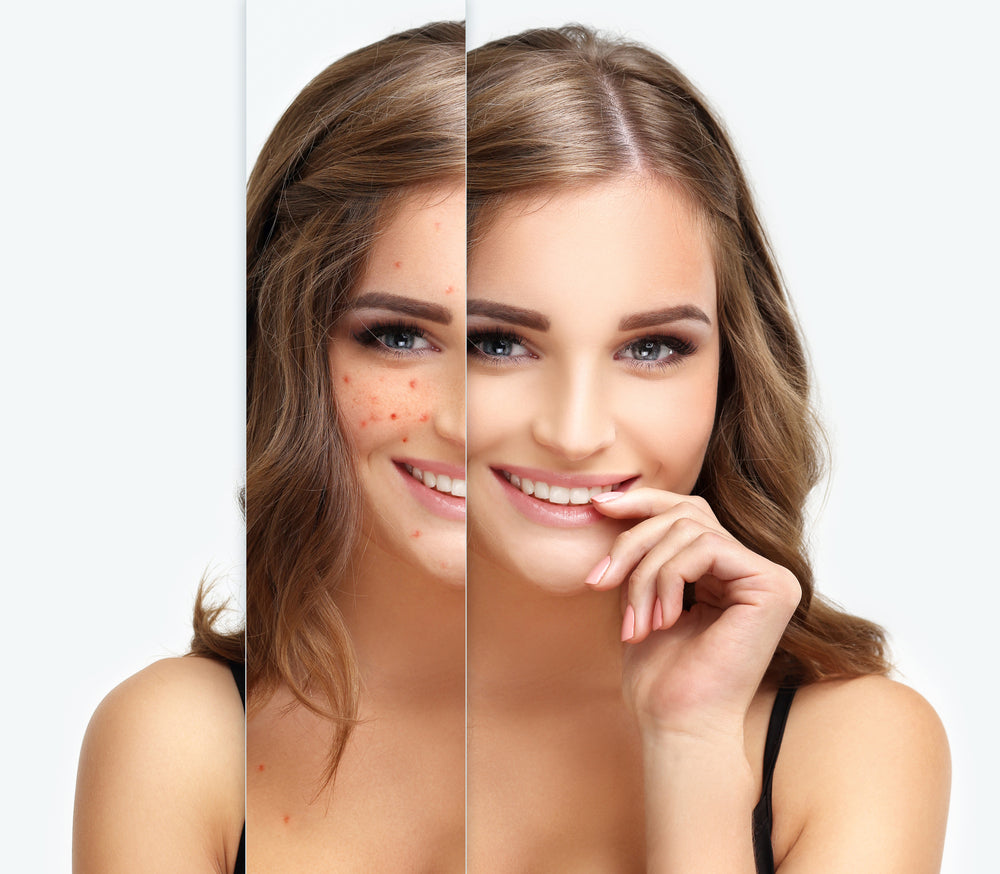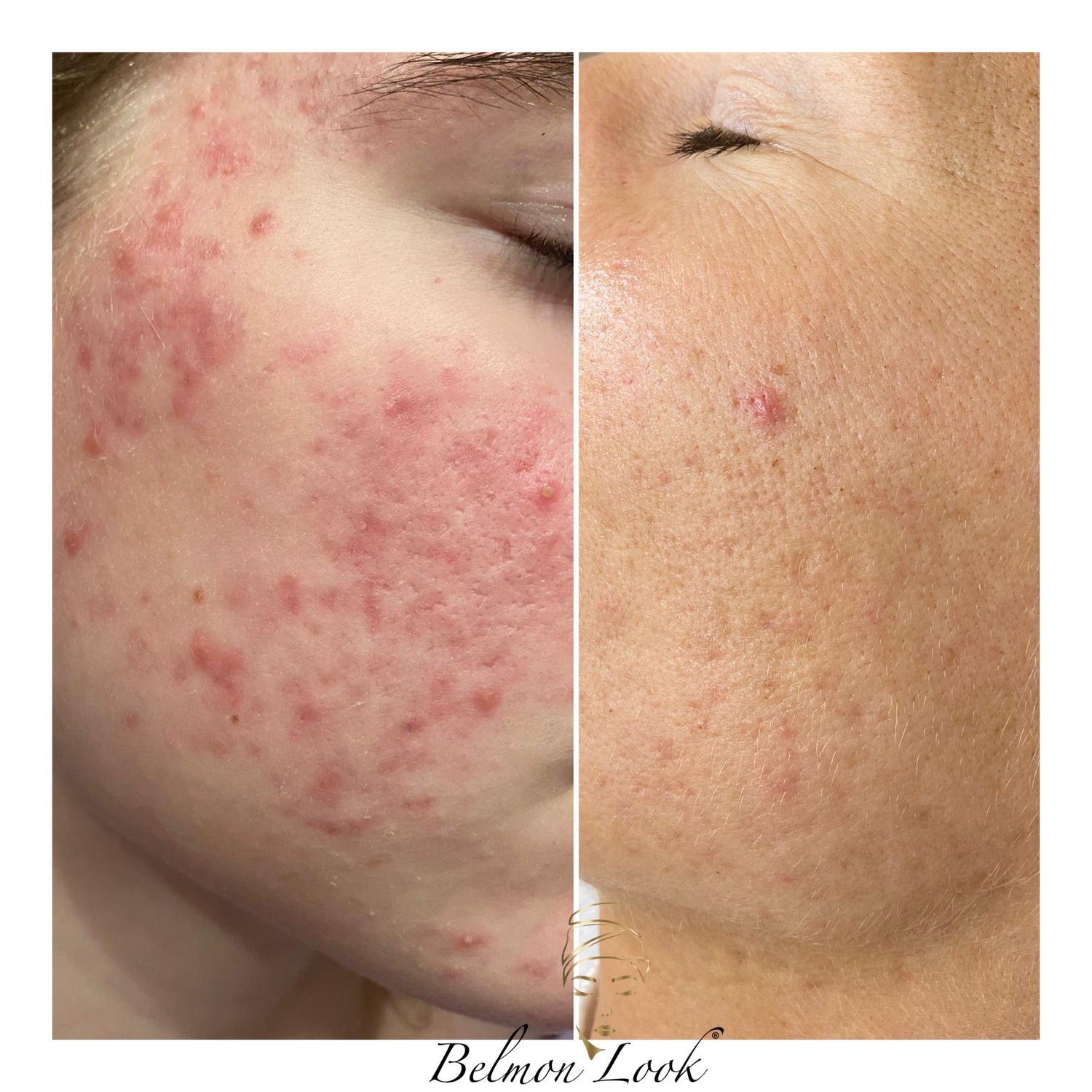acne

different forms of acne with their causes and associated symptoms
Akne – Vielschichtiges Hautbild, gezielte Therapie
mehr Erfahren
Akne ist eine der häufigsten dermatologischen Erkrankungen und betrifft nicht nur Jugendliche, sondern kann in jedem Lebensalter auftreten. Es handelt sich um eine chronisch-entzündliche Erkrankung der Talgdrüsenfollikel, die durch eine übermäßige Sebumproduktion, Verhornungsstörungen (Hyperkeratose) und bakterielle Besiedlung – vor allem mit Cutibacterium acnes – gekennzeichnet ist. Hinzu kommt eine ausgeprägte entzündliche Immunantwort, die zu Papeln, Pusteln und in schweren Fällen zu Knoten oder Zysten führt.
Die sogenannten endogenen Akneformen entstehen im Körperinneren und sind nicht von außen übertragbar. In den meisten Fällen sind hormonelle Veränderungen – etwa in der Pubertät, während des Zyklus oder in der Schwangerschaft – die Auslöser. Seltener treten spezielle Formen auf wie die Acne neonatorum (Neugeborenenakne), Acne infantum (Kleinkindakne zwischen dem 3. und 12. Lebensmonat) oder die Acne tarda (Erwachsenenakne), die häufig mit hormonellen Dysbalancen oder Stress korreliert.
Daneben gibt es exogene Akneformen, die durch äußere Faktoren getriggert werden können, wie Medikamente (z. B. Cortison), komedogene Kosmetika oder mechanische Irritationen. Auch psychogene Einflüsse wie ständiges Manipulieren der Haut (Skin Picking) oder phototoxische Reaktionen können das klinische Bild verschlechtern. Bekannte Sonderformen sind die Acne aestivalis (Mallorca-Akne) oder die Acne venenata (Kontaktakne durch bestimmte Substanzen).
Da Akne ein multifaktorielles Geschehen ist, steht am Beginn jeder Behandlung eine präzise Analyse von Hauttyp, Hormonstatus, Lebensstil und bestehenden Triggerfaktoren. Auf Basis dieser Diagnostik erstellen wir einen individuellen Therapieplan, der in seiner Intensität an die Ausprägung der Akne angepasst wird. Dabei kommen kontrollierte Peelingverfahren (z. B. BHA oder sanfte AHA-Peelings), apparative Tiefenreinigung, Mikro- oder Kaltplasma zur Keimreduktion, sowie hochwirksame antiinflammatorische und talgregulierende Seren zum Einsatz. Bei hormonell bedingter Akne können ergänzend systemische Maßnahmen empfohlen werden, in enger Abstimmung mit behandelnden Fachärzt:innen.
Ziel der Therapie ist es, den Entzündungszyklus zu durchbrechen, die Talgproduktion zu regulieren, die Hautbarriere zu stabilisieren und das Risiko für postinflammatorische Hyperpigmentierungen oder Narbenbildung zu minimieren. Regelmäßige Sitzungen sowie eine begleitende, nicht-komedogene Heimpflege sind entscheidend für einen nachhaltigen Behandlungserfolg.
„So verschieden wie die Ursachen, so individuell die Therapie – für ein klareres Hautbild und weniger Entzündungen.“
ENDOGENOUS ACNE - Types of acne and differences with internal causes
-
ACNE COMEDONICA
Affected areas in most cases:
- Nose
- Forehead
- cheeks
- rarely also on the back
Symptoms:
- very few, slightly inflamed papules
- increased comedones (blackheads)
Age group:
- Adolescence to the end of puberty
Scarring:
- very low
Healing:
- often heals completely without lasting damage
-
ACNE VULGARIS
Affected areas in most cases:
- Nose
- Forehead
- cheeks
- rarely also on the back
Symptoms:
- several slightly inflamed papules
- increased comedones (blackheads)
Age group:
- Adolescence, puberty to early adulthood
Scarring:
- very low
Healing:
- often heals completely without lasting damage
-
Acne Papulo Pustulosa
Affected areas in most cases:
- Nose
- Forehead
- cheeks
- rarely also on the back
Symptoms:
- moderate to severe form of acne
- increased comedones (blackheads)
- Inflammations are not yet so pronounced
- comedones form purulent nodules
Age group:
- Adolescence until the end of puberty
Scarring:
- are possible due to inflammatory processes
Healing:
- often heals completely with slight scarring
-
Acne conglobata
Affected areas in most cases:
- Nose
- Forehead
- cheeks
- rarely also on the back
Symptoms:
- most severe form of acne
- large inflammations with nodules and papules
- possible fistula formation
- Abscesses may occur
Age group:
- Adolescence, puberty, early adulthood and late adulthood, even after menopause
Scarring:
- significant scarring with permanent retention
Healing:
- often
difficult to heal, requires long therapy with the help of
Allergy tests, blood count, urine and stool samples.
Bioresonance performed.
-
Acne Fulminans
Affected areas in most cases:
- Nose
- Forehead
- cheeks
- rarely also on the back
Symptoms:
- very rare form of acne (acne maligna)
- Symptoms comparable to ACNE Conglobata
- Additional symptoms may include leukocytosis, inflammation of joints and fever
Age group:
- all age groups
Scarring:
- there is a risk of significant scarring
Healing:
- difficult to heal with significant long-term consequences.
EXOGENOUS ACNE - Types of acne and differences due to external causes
-
ACNE EXCORIEE
Affected areas in most cases:
- all body parts accessible to the affected persons
Symptoms:
- constant compulsive pressing or scratching
- Affected people perceive even the smallest blackheads as disturbing and have to express them
- manipulative inflammation, crusting and scarring occur
Age group:
- all age groups
Trigger:
- Control disorders due to stress
- Psychological causes
Healing:
- Completely healed when manipulation is stopped and the patient cooperates.
-
ACNE COSMETICA
Affected areas in most cases:
- Face
- cleavage
Symptoms:
- Clogged pores
- comedones
Age group:
- all age groups
Scarring:
- Scarring only occurs when visible blackheads and blemishes are squeezed out by the affected person themselves.
Healing:
- Completely disappears when the cosmetic product causing the problem is discontinued.
-
MEDICATED ACNE
Affected areas in most cases:
- Face
- Breast
- Shoulder
- Back
Symptoms:
- constant compulsive pressing or scratching
- Affected people perceive even the smallest blackheads as disturbing and have to express them
- manipulative inflammation, crusting and scarring occur
Age group:
- all age groups
Trigger:
- Drugs in the form of barbiturates (depressants of the nervous system)
- Lithium medications (psychosis)
- Medications in the form of glucocorticoids (cortisone)
- Overdose of vitamins B6, B12 or D2
- Hormonal forms of contraception
Healing:
- Completely healed when the intake is stopped and the substance causing the problem is replaced.
Course of therapy
Preliminary discussion
It is about a
Anamnesis tries to find out the cause of acne. We
will discuss various topics together to determine the start date of the
Finding out about acne and its trigger.
- Occupational history
- Leisure history
- Nutritional history
- Family history
Skin analysis: A skin analysis is carried out based on previous
Experience and in-depth knowledge of dermatology. Should
If the skin analysis does not prove to be informative, the
A family doctor or an endocrinologist (hormone specialist) is consulted to work out possible further diagnoses together.
Treatment plan: A treatment plan is developed together and continually adjusted as the skin improves. In addition, the diet, daily cleansing routine, and intake of various vitamins and micronutrients are adjusted.
Treatment success: We never promise a cure. However, based on several years of professional experience, we can report significant and rapid improvement, sometimes even complete healing, in all our treated clients to date.
Folgende Techniken werden bei dieser Behandlung angewendet:
-
Peelings
- Bianco System
- Carbon Peel
- Hyalax Peel
- BioRePeel CL13
- PRX-T33
- Lacticid Peel
-
Apparative Anwendungen
- Microneedling
- PhiBright Needling
- Diamantdermabrasion
- Hydrafacial
- Skin Blading
- Oxygen Drop
-
Frequenzen
- Galvano
- Cold- & Heat Plasma
- Iontophorese
- Radiofrequenz
- Hochfrequenz
- Laser
Bei jedem Behandlungspaket werden je nach aktuellem Hautzustand unterschiedliche Techniken gezielt ausgewählt und miteinander kombiniert. So wird individuell auf die Bedürfnisse der Haut eingegangen und ein optimaler Behandlungseffekt erzielt.

Kosten & Dauer
Klassiche Kosmetik 159,00€
Secret RF - Needling 399,00€
Laser 299,00€
Behandlungsdauer ca. 60 bis 90min
Hautanalyse - Skinprep - Anwendung - Nachsorge Gespräche - Heimpflege - Vitalstoffe
